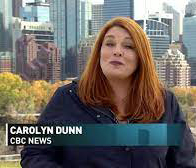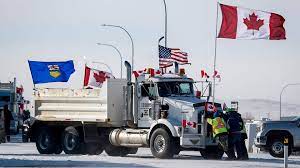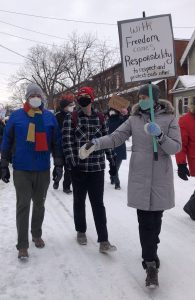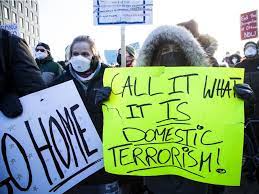
Until last weekend, I’d become kind of blasé to the words of protest and counter-protest. Every day, I’d read the latest on the demonstrations at Parliament Hill and the border crossings and winced at the deadlock and rhetoric. And, as I pointed out last week, I feared for wider freedom being trampled.
But a TV news story the other night stopped me in my tracks. Carolyn Dunn, CBC’s Alberta reporter, stood adjacent to flashing police cruiser lights, and parked semi-trailer trucks near Coutts, Alta., reporting but also looking over her shoulder anxiously.

“Things remain tense for citizens and the media,” Dunn said in her report. She went on to say that some of the demonstrators had directed abusive language at her and other reporters. In other words, in a weirdly Trumpian way, media not just mandates, had become the enemy. And Dunn said she felt uncomfortable having to hide who she was from strangers. “We’ve been told to be careful.”
After weeks of street occupation in Ottawa, the blockading of the Ambassador Bridge in Windsor and intermittent trucker traffic jams on University Avenue in Toronto by the so-called “Freedom Convoy,” I don’t think many people were surprised by either Doug Ford’s state-of-emergency declaration, nor Justin Trudeau’s invoking the never-before-used Emergency Act.
But what neither legal response is likely to halt is the public’s genuine fear of being outed by so-called convoy supporters. In this week’s edition of The Hill Times, in Ottawa, Mike Lapointe wrote that he and his media colleagues had contended with “pretty intense anti-media sentiment.”
Not only have some anti-mandate leaders and their followers threatened reporters and camera crews; they’ve also been “doxxing” public servants. That is, they’ve published the personal information of Members of Parliament with malicious intent.
And the tactic worked. Within days, demonstrators with placards, loudspeakers and foul tempers began parading in front of the homes of MPs in the Ottawa-Gatineau area. I believe strongly in the right to free speech, but stalking lawmakers where they live, taunting them, and calling them treasonous, I think, makes convoy demonstrators look like Hitler’s Brownshirts.
These ugly convoys, now lost in extremist rhetoric, came even closer to home when demonstrators drove transports, pickups and tractors to the heart of Toronto’s hospital row last weekend. Health-care workers on University Avenue were so intimidated by the potential for violence directed against them, that Toronto Police Service circulated a memo to them:
“Out of an abundance of caution (TPS) suggests you not wear clothing which might identify you as a hospital worker on your way to and from work,” the police document warned.
A year ago, these thousands of doctors, nurses, orderlies et al were considered heroes. Everybody applauded them and bashed pots and pans on their balconies and doorsteps each night in support. But in the wake of Donald Trump’s mishandling of the pandemic and his misguided disbelief in science, health-care workers across North America have felt the brunt of anti-vaccine and anti-mandate hostility, threats and violence from the alt-right and their kin.
How demoralizing and disheartening, for hospital workers to feel so intimidated.
“There’s been harassment and bullying,” health-care worker Vikky Leung told CBC News recently. “There’s been emails telling (us) not to wear scrubs, that identifies (us) as health-care workers. That’s truly scary.”
I really thought we’d lost out completely to intimidation and fear of being identified for supporting vaccination, masking and the good of public safety for all.

Then, I heard about Andrea Harden, the Ottawa resident who decided she wasn’t going to take the occupation anymore.
Last weekend, she learned that more trucks were convoying along Riverside Drive toward Ottawa’s downtown. So, she called on five other women in her neighbourhood. Together they began walking in circles at one end of the Billings Bridge and – allowing regular traffic through – they prevented trucks with flags and anti-mandate slogans from continuing into downtown, telling their drivers to turn around and leave.
“Before I knew it,” she told CBC Radio, “I had my back to the hood of a truck as it tried to move past. Eventually he stopped and turned around.”

Harden explained that when they could she and the other women – eventually numbering 30 – struck up conversations with the convoy drivers, explaining that they were standing up for their community’s rights to free passage. She and her fellow counter-protesters stayed there all day.
I’m not usually in favour of taking the law into one’s own hands, but when Canadian journalists, health-care workers or residents cannot live, work or move freely out of fear of being demonized for who they are or what they do, that’s the end of civil society and a line no convoy or anti-vaxxer may cross.